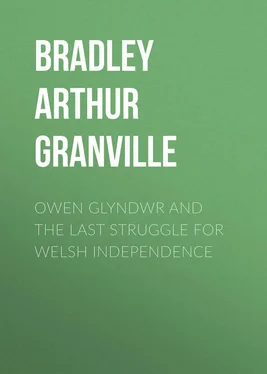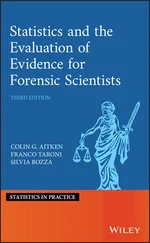Arthur Bradley - Owen Glyndwr and the Last Struggle for Welsh Independence
Здесь есть возможность читать онлайн «Arthur Bradley - Owen Glyndwr and the Last Struggle for Welsh Independence» — ознакомительный отрывок электронной книги совершенно бесплатно, а после прочтения отрывка купить полную версию. В некоторых случаях можно слушать аудио, скачать через торрент в формате fb2 и присутствует краткое содержание. Жанр: foreign_antique, foreign_prose, foreign_language, на английском языке. Описание произведения, (предисловие) а так же отзывы посетителей доступны на портале библиотеки ЛибКат.
- Название:Owen Glyndwr and the Last Struggle for Welsh Independence
- Автор:
- Жанр:
- Год:неизвестен
- ISBN:нет данных
- Рейтинг книги:5 / 5. Голосов: 1
-
Избранное:Добавить в избранное
- Отзывы:
-
Ваша оценка:
- 100
- 1
- 2
- 3
- 4
- 5
Owen Glyndwr and the Last Struggle for Welsh Independence: краткое содержание, описание и аннотация
Предлагаем к чтению аннотацию, описание, краткое содержание или предисловие (зависит от того, что написал сам автор книги «Owen Glyndwr and the Last Struggle for Welsh Independence»). Если вы не нашли необходимую информацию о книге — напишите в комментариях, мы постараемся отыскать её.
Owen Glyndwr and the Last Struggle for Welsh Independence — читать онлайн ознакомительный отрывок
Ниже представлен текст книги, разбитый по страницам. Система сохранения места последней прочитанной страницы, позволяет с удобством читать онлайн бесплатно книгу «Owen Glyndwr and the Last Struggle for Welsh Independence», без необходимости каждый раз заново искать на чём Вы остановились. Поставьте закладку, и сможете в любой момент перейти на страницу, на которой закончили чтение.
Интервал:
Закладка:
In the ninth century the Danes appeared upon the scene. Though they harried Wales from time to time, both in the interior and on the coast, their doings in England were so incomparably more serious that their Welsh exploits almost escape our notice. About the year 890, Danish outposts were established beneath the Breiddon hills, that noble gateway of mid-Wales, through which the Severn comes surging out into the Shropshire plains. Hither four years later came that formidable Danish leader, Hastings, with the Anglo-Danish forces of East Anglia and the north behind him. King Alfred, who was in the west, hastened to the scene and contributed to this strange spectacle of Saxons and Cymry fighting side by side. A decisive victory at Buttington, near Welshpool, rewarded their efforts, and though the struggle between Dane and Saxon was of great service to Wales by bringing a long immunity from the attacks of her hereditary foe, the Danish name calls for little more notice in Welsh annals.
Seeing that vague dreams of reconquest still lingered among the Welsh, England’s difficulty, to apply a familiar modern aphorism, should have been Cambria’s opportunity. But readily as the three Welsh Princes, when their common country was in danger, were accustomed to combine, and efficiently as they raided in independent fashion across the English border, cohesion for a serious aggressive movement was almost hopeless. The moment that they were safe, they turned their arms against each other. The whole history of Wales, from the days of Roderic to those of Edward, with a few brief intervals, is one long tale of bloody strife.
Nor were the Princes of Gwynedd, Powys, and Deheubarth always content to fight their quarrels out alone. As time went on they grew more accustomed to their Saxon neighbours, even if they did not love them more. Occasional amenities became possible. Intermarriages between the two aristocracies were not unknown, and when they had progressed thus far a Prince of Powys would scarcely have been human if he had not occasionally been tempted to call in Saxon aid against his powerful rivals of Gwynedd or Deheubarth. But in spite of this dangerous game, played often enough and in later Norman days so fatal, the soil of Wales, so far as any serious occupation or dominion is implied, remained inviolate throughout the whole Saxon period.
One very narrow escape from a permanent lodgment of Saxons, of which the Welsh chronicle tells us, should not perhaps be passed over. It occurred in the days when Anarawd, one of the sons of Roderic, was ruling over North Wales, at the close of the ninth century. More than a hundred years before, the Mercians, under Offa, had driven the Welsh finally from Shropshire and pressed them back behind the famous Dyke, whose clearly marked course still preserves the name of their warlike monarch. The great Saxon victory on Rhuddlan March, at the mouth of the Clwyd, had occurred soon afterwards, and the wail of the defeated is still sounded in one of the most notable of Welsh airs. But Offa’s Dyke had been since then considerably overleaped, and the slaughter of Rhuddlan had been long avenged. When the descendants of these same Mercians poured once more into the pleasant country that lies upon the north shore between Chester and the Conway, the invaders of the “Perfeddwlad,” as this region was then called (a term I shall use for convenience throughout this chapter), proved too powerful for Anarawd. He was driven back into Snowdonia and Anglesey, and the Saxons settled down in the Vale of Clwyd and upon either side of it, with a deliberation that, but for an opportune accident, would have probably converted a large slice of North Wales into a piece of England for all time. But just as the Strathclyde Britons in the days of Cunedda had brought to Wales in the time of her need after the Roman departure a valuable and warlike element, so their descendants, four centuries later, came just in time to save what are now the Celtic districts of Flint and northern Denbigh from becoming Saxon. These people, hard pressed in north Lancashire, Cumberland, and even beyond, by Danes and Saxons, decided to seek a new home, and their thoughts naturally turned to Wales. They made overtures to Anarawd, begging that he would grant them of his abundance sufficient territory for their needs. But Anarawd’s kingdom had, as we have seen, been sadly circumscribed, and his homeless subjects from the east of the Conway were already on his hands. A bright thought struck him, and he informed his Strathclyde kinsmen that if they could reconquer the Perfeddwlad they were welcome to it. Necessity, perhaps, nerved the arms of the wanderers, and the Saxons, who, as Dr. Powell quaintly puts it, “were not yet warm in their seats,” were driven headlong out of Wales. The Mercians, however, were not the kind of men to sit quietly down after such an ignominious expulsion; they made vigorous preparations for taking their revenge, and retrieving their fortunes and their honour. The Strathclyde Britons sorely doubted their powers of resistance to the great force which now threatened them, so, carrying all their cattle and effects back again across the Conway, they begged Anarawd in his own interest as well as in theirs to support them. The Prince of Gwynedd rose nobly to the occasion and, joining all his forces to those of his immigrant kinsmen, they met the returning Saxon invaders near Conway, and in a pitched battle drove them back to the Dee with prodigious slaughter, never to return. So the country between the two rivers was preserved to the Cymric race and saved from becoming, as for the moment looked extremely probable, another Cheshire or Shropshire.
Anarawd, however, could not rest content with his triumph over the Saxons. As an illustration of the thirst for war that seems to have been chronic with most of the Welsh Princes, it may be noted that, with the Saxons vowing vengeance on his borders, he did not hesitate to march into South Wales and make an unprovoked attack upon its Prince, his own brother.
But with the death of Anarawd and his brothers, various contingencies, which need not detain us here, made Howel Dda, or Howel the Good, both the heir and the acceptable ruler of all three provinces. His reign was unique in Welsh annals, for it was not only long, but almost peaceful. This excellent Prince turned his brilliant talents and force of character almost entirely to the civil and moral elevation of his people. He drew up his famous code of laws, which, as is sometimes asserted, unconsciously influence the legal instincts of remoter Wales even to this day. In the preparation of this great work he summoned his bishops and nobility and wise men to meet him at Ty Gwyn on the Towy, for it should be noted that this ruler of a temporarily united Wales was in the first instance Prince of Deheubarth.
Here this select assembly spent the whole of Lent, fasting and praying for the Divine aid in their approaching task. Howel then picked out from among them the twelve most capable persons, with the Chancellor of Llandaff at their head, and proceeded to examine in exhaustive fashion all the laws of the Cymry. Of these they eliminated the bad, retained the good, and amended others to suit present requirements. This new code was then ratified by the entire assembly before it dispersed. Three copies were made, and it is significant of the change already creeping over the Welsh Church, that Howel and his four bishops are said to have journeyed to Rome and submitted one of them to the Pope for his approval. The Laws of Howel Dda may be read to-day by anyone with access to a reference library. The rights of every class of person are herein clearly set forth, and the precise value of each man’s life according to his rank, and of every animal’s hide and carcase accurately defined. The tribal sanctity of land, too, is well illustrated by a law forbidding the owner of an estate to mortgage it to anyone but a kinsman. Books, harps, swords, and implements of livelihood were exempted from distraint, while among livestock horses were placed in the same category, as being necessary for defence. Suits in connection with land could not be heard between February and May, or between May and August, since these were the periods of seed-time and harvest, while all cases touching inheritance were to be heard by the King himself. The latter is pictured to us as sitting in his judicial chair above the rest of the Court, with an Elder upon either hand and the freeholders ranged upon his right and left. Immediately below the King sat the Chief Justice of the Province, with a priest upon one side of him and the Judge of the Commote upon the other.
Читать дальшеИнтервал:
Закладка:
Похожие книги на «Owen Glyndwr and the Last Struggle for Welsh Independence»
Представляем Вашему вниманию похожие книги на «Owen Glyndwr and the Last Struggle for Welsh Independence» списком для выбора. Мы отобрали схожую по названию и смыслу литературу в надежде предоставить читателям больше вариантов отыскать новые, интересные, ещё непрочитанные произведения.
Обсуждение, отзывы о книге «Owen Glyndwr and the Last Struggle for Welsh Independence» и просто собственные мнения читателей. Оставьте ваши комментарии, напишите, что Вы думаете о произведении, его смысле или главных героях. Укажите что конкретно понравилось, а что нет, и почему Вы так считаете.












